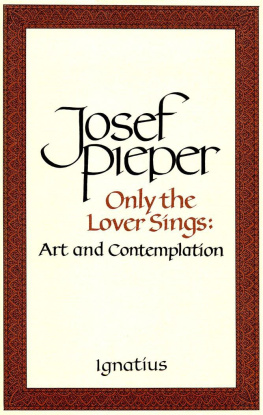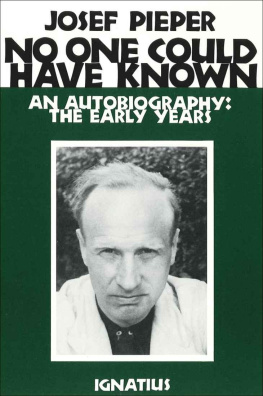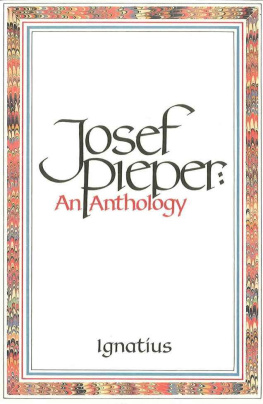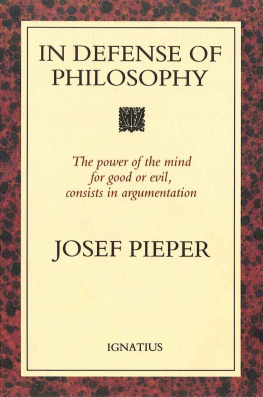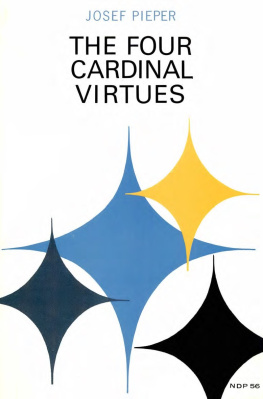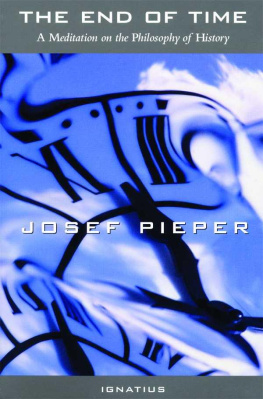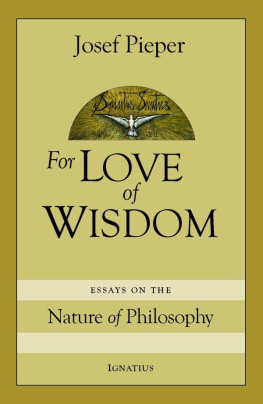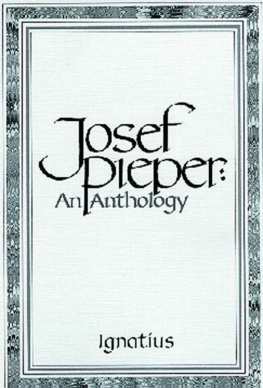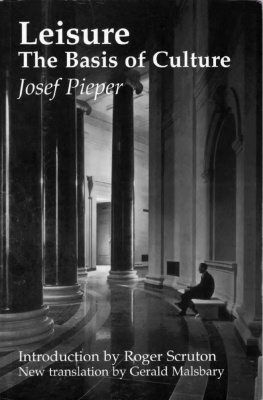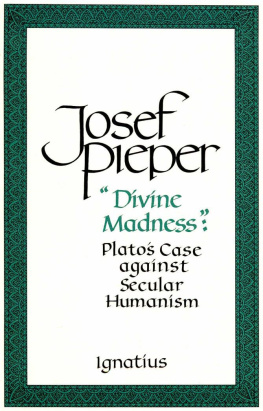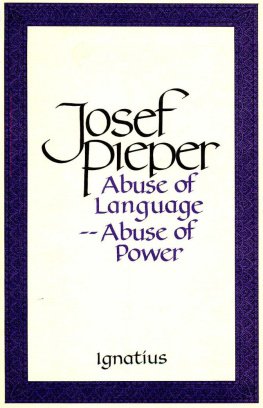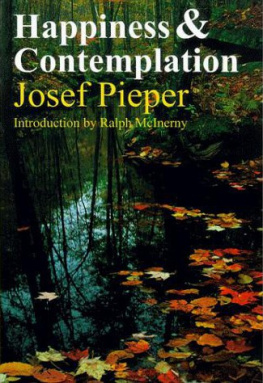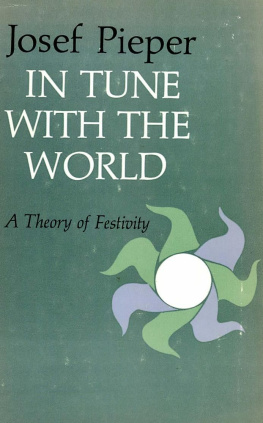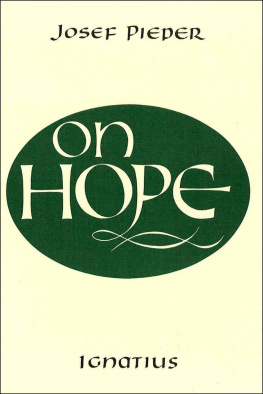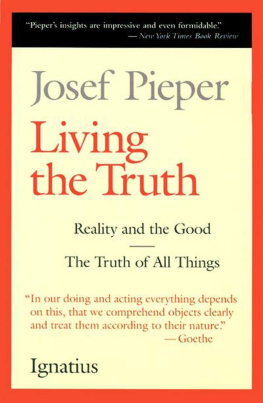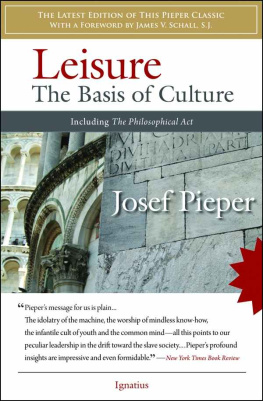ONLY THE LOVER SINGS
Art and Contemplation
JOSEF PIEPER
ONLY THE LOVER SINGS
Art and Contemplation
Translated by Lothar Krauth
IGNATIUS PRESS SAN FRANCISCO
Title of the German original:
Nur der Liebende singt 1988 Schwabenverlag AG Ostfildern bei Stuttgart, Germany
Cover design by Roxanne Mei Lum Cover border by Pamela Kennedy Calligraphy by Victoria Hoke Lane
1990 Ignatius Press, San Francisco All rights reserved ISBN 0-89870-302-6 Library of Congress Catalogue Number 90-81771 Printed in the United States of Ameri
Cantare amantis est
St. Augustine
Reason speaks in words alone
But love has a song
- Joseph de Maistre
Dedicated to Hilde Schrk-Frisch Sculptor and Friend
CONTENTS
PREFACE
These meditations define a great arc, spanning the distance from Augustine's marvelously formulated insight that "only he who loves can sing" all the way to the anguished cry of Hlderlin's ode entitled "Wherefore Poets in a Time of Distress?" The intent here is to make one thing clear: that music, the fine arts, poetry anything that festively raises up human existence and thereby constitutes its true riches all derive their life from a hidden root, and this root is a contemplation which is turned toward God and the world so as to affirm them.
WORK, SPARE TIME, AND LEISURE
T HESE THREE CONCEPTS, at first sight, do not give any indication that they hide a deeply challenging problem, and no mere theoretical problem either. No, they rather give the impression of being entirely innocuous; they could easily be understood, approvingly or with reservations, as an invitation "to take it easy". Our title seems to project an uncomplicated, even cheerful, serenity, progressing from one concept to the next. "Work", it is true, may still be part of life's burden, but it is already alleviated and forgotten as it leads to "spare time" and finally to "leisure", with its vision of the solitary fisherman who in utter contentment sits on a summer lakeshore, less intent on catching a fish than simply on relaxing and daydreaming. Where, pray, should the problem be lurking? The term and concept of "work" are entirely familiar to us. Work is that which gives man's workday its name; it satisfies our basic needs and procures our daily bread; it constitutes the active effort to provide those things indispensable in order to stay alive. Nothing is more obvious. And why should the meaning of "spare time" not be equally obvious? Spare time is a multilayered concept. As long as it is defined negatively, as a span of time not filled with work, no problem arises. Similarly, if we consider the concept of spare time only in its relationship to the concept of "workday", if we define spare time as a mere break from work in order to recover, a time after work to restore one's strength for more work, then again, no particular problem will arise. But some second thought might stir us up as soon as we consider that we do not really succeed in defining spare time only in this way. A moment ago I used, in all innocence, the term "workday". The notion of workday immediately evokes one other notion, closely related, which provides a rather fresh and now positive definition of spare time a definition indicating that here we are discussing something beyond a mere break in working time or a pause to gather new strength. This other notion is "holiday". On the one hand, we have not succeeded rather: not yet! in eliminating the notion of holiday from our thinking (which shows the persistence of Western tradition.) On the other hand, this notion of holiday has generally lost for us its clarity, depth, and unquestioned inner meaning (which indicates how weakened and threatened our Western standards have become). A holiday, a feast day what is this, anyway, and what in essence does it mean? How does the spirit of celebration originate in the heart of man, how can it be fostered and preserved? And how can we possibly observe a feast day on a truly existential level without such a spirit of celebration? I very much fear that the typical modern man may no longer be able to draw answers to these questions from immediate awareness and inner experience. Of course, we still have some vague notion that the seventh day of the week is not simply the "weekend" but has a deeper significance. We still are receptive to the reminder implied in that uniquely German term Feierabend [meaning, "quitting time", but literally, "evening for celebration"] the reminder that more is meant here than a mere break to catch one's breath. And we still have not entirely forgotten that the German word Ferien (vacation time) literally means "festive time". All of which, taken together, means one thing: the concept of spare time is by no means so simple and innocuous as at first it may have appeared. It springs from some profound dimension where it merges, lacking precise bounds, with the third concept, that of "leisure".
About this concept we confidently dare to affirm that we do not know what it means. More to the point: we are ignorant of how the concept of "leisure" is understood in the accumulated wisdom of our Western cultural and existential tradition as expressed, say, by Plato, Aristotle, or the great teachers of Christianity. Granted, one could say: but why should we know that? What difference does this particular ignorance make? The way we see the human person and therefore the meaning of our existence has, after all, changed considerably since the time of antiquity and the Middle Ages!
Such an objection must not be taken lightly. At any rate, however, even should we agree with it (and then especially), we have to realize what in truth this discussion is all about. We must understand that a total and final disintegration of the concept of "leisure", a basic concept of traditional Western thinking, will have a clear historical consequence; namely, the totalitarian work state. If we dislike this consequence, we must understand that there can be only one valid objection against the idolizing of labor, an objection based on some ultimate truth about human nature and therefore of sole and lasting relevance. To identify such an objection, we must discover anew, and appropriate again, the meaning of the statement, "We work so we can have leisure." What indeed is declared here? A veritable thicket of misconceptions must be cleared away before the true meaning of this statement can appear. For this purpose, it is indispensable to spell out certain simple basics. It seems the German language is no help in this, since Musse (leisure) and Mssiggang (loafing) distressingly are such close neighbors, though in terminology only. Looking at the factual content, "loafing" is the exact opposite of "engaging in leisure" (as the ancient Greeks put it, scholn agein). "We work so we can have leisure", would therefore, as a preliminary approach, declare this: we work in order to do to enable us to do something other than work. What is this "something other"? Recreation, entertainment, amusement, play all this is not meant here. Wouldn't it be quite nonsensical to think of work as drawing its justification from play? No, this "something other" indicates an activity meaningful in itself. But is not work equally meaningful? Meaningful indeed! Yet not meaningful in itself. This precisely defines the concept of work: it has a practical purpose, it produces utilitarian goods, it contributes to the common useful wealth (and "useful" always means "good for something else"). To serve some other purpose is the essential characteristic of work. In this context also belongs the old and rather offensive expression, "servile work". The terms alone do not at all imply any contempt for work, much less for the worker. We can say the opposite is true. But then, traditional wisdom has always understood that there are also human activities that do not serve some other purpose and so are not servile. These are forms of activities to which everybody, including the working man, is entitled, even as a fundamental right and necessity (in the same way as the servile activity, namely work, which satisfies basic needs and serves a practical purpose, is as a rule required of everybody). At this point it seems advisable to mention the old distinction some would say, the old-fashioned and only historically relevant distinction between "servile arts" and "liberal arts", artes serviles and artes liberales. This distinction, in fact, is anything but old-fashioned; it can claim a contemporary political relevance. Translated into the jargon of a world defined by work alone, it says: not only do production quotas and the implementation of planning goals exist, but in addition and by right, there are human activities that by their very nature lie beyond the standards of any five-year-plan. This means that there are human actions that need not be justified by a society's yardstick of economical usefulness, and absolutely so. All we have to do is use such terms to bring out the radical challenge to the domain of absolute work. This challenge is contained in the traditional Western tenet: there do exist "liberal arts", there do exist human activities that are meaningful without being either work or mere respite (from work, for more work). This too, I hope, has become clear: it is an insidiously dangerous and consequential undertaking to deny that work is characterized by its "usefulness-for-something-else", even yes! by its "servile" dimension. It is a fiction to declare work, the production of useful things, to be meaningful in itself. Such fiction leads to the exact opposite of what it seems to accomplish. It brings about the exact opposite of "liberation", "elevation", or "rehabilitation" for the worker. It brings about precisely that inhuman dimension so typical of the world of absolute work: it accomplishes the final bondage of man within the process of work, it explicitly makes everybody a proletarian. This is happening openly and explicitly in those totalitarian "Workers' States", but it is also infecting all other parts of the world, at least as a danger and temptation. It shows, for instance, in the difficulty we experience in answering this question: of what, then, might such activity "meaningful in itself", such "liberal" activity, consist? How should we conceive of such an activity that does not need something other for its justification, that is not defined as producing useful goods and objective results? An activity that does not bring forth the means for our existence but is existential realization itself, an activity in which man's true and proper good, his genuine richness, fullest life, and most perfect happiness is attained?
Next page
